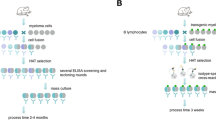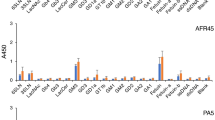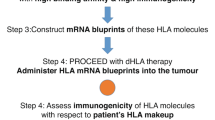Abstract
MONOSPECIFIC antibodies produced by clones derived from appropriate hybridomas represent a new immunological tool of great analytical potential1,2. In this report several antibodies against different surface antigens of human lymphocytes are described. They were obtained and isolated as individual monoclonal products after fusion of splenocytes from an immunised mouse with a mouse myeloma line.
This is a preview of subscription content, access via your institution
Access options
Subscribe to this journal
Receive 51 print issues and online access
$199.00 per year
only $3.90 per issue
Buy this article
- Purchase on Springer Link
- Instant access to full article PDF
Prices may be subject to local taxes which are calculated during checkout
Similar content being viewed by others
References
Köhler, G. & Milstein, C. Eur. J. Immun. 6, 511–519 (1976).
Galfré, G., Howe, S. C., Milstein, C., Butcher, G. W. & Howard, J. C. Nature 266, 550–552 (1977).
Köhler, G., Howe, S. C. & Milstein, C. Eur. J. Immun. 6, 292–295 (1976).
Trucco, M., Galfré, G., De Marchi, M., Varetto, O. & Carbonara, A. O. Tissue Antigens 10, 343–344 (1977).
Littlefield, J. W. Science 145, 709 (1964).
Levy, R. & Dilley, J. J. Immun. 119, 387–393 (1977).
Stocker, J. W., Ceppelini, R. & Trucco, M. M. in Current Trends in Tumor Immunology (ed. Gorini, S.) (Firenze Fond, Menarini, in the press).
Jones, E. A., Goodfellow, P. N., Bodmer, J. G. & Bodmer, W. F. Nature 256, 650–653 (1975).
Bernoco, D. et al. Tissue Antigens 8, 253–260 (1976).
Reisfeld, R. A., Allison, J. P., Ferrone, S., Pellegrino, M. A. & Poulik, M. D. Transplant Proc. 8, 173 (1976).
Farr, R. S. J. infect. Diseases 103, 239 (1958).
Gearhart, P. J. Nature 269, 812–813 (1977).
Laemmli, U. K. & Faure, M. J. molec. Biol. 80, 575–599 (1973).
Cotton, R. G. H., Secher, D. S. & Milstein, C. Eur. J. Immun. 3, 135–140 (1973).
Lampson, L., Levy, R., Grumet, F. C., Ness, D. & Pious, D. Nature 271, 461–462 (1978).
Sanderson, A. Nature 269, 414–415 (1977).
Minowada, J., Ohnuma, T. & Miller, G. J. Virol. 6, 699–701 (1970).
Rogentine, G. N. Histocompatibility Testing 1967, 371–379 (Munksgaard, Copenhagen, 1967).
Bodmer, W. F., Tripp, M. & Bodmer, J. G. Histocompatibility Testing 1967, 341–350 (Munksgaard, Copenhagen, 1967).
Mottironi, V. D. & Terasaki, P. I. Histocompatibility Testing 1970, 301–307 (Munksgaard, Copenhagen, 1970).
Author information
Authors and Affiliations
Rights and permissions
About this article
Cite this article
TRUCCO, M., STOCKER, J. & CEPPELLINI, R. Monoclonal antibodies against human lymphocyte antigens. Nature 273, 666–668 (1978). https://doi.org/10.1038/273666a0
Received:
Accepted:
Issue Date:
DOI: https://doi.org/10.1038/273666a0
This article is cited by
-
HLA-DQ polymorphism analyzed by sequential restriction endonuclease DNA digestion
Immunogenetics (1986)
-
DQ ? and ? RFLP reveals the composition of the DQ molecule recognized by T-cell clones
Immunogenetics (1986)
-
Essential requirement for major histocompatibility complex recognition in T-cell tolerance induction
Nature (1984)
-
Tolerance of T-cell clones is associated with membrane antigen changes
Nature (1983)
Comments
By submitting a comment you agree to abide by our Terms and Community Guidelines. If you find something abusive or that does not comply with our terms or guidelines please flag it as inappropriate.



